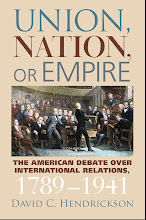When Lehman Brothers and American International Group collapsed in mid-September 2008, it was like the fall of the twin towers seven years before. Symbols of American financial prowess had crumbled to dust, betokening a world shaken to its very foundation.
Important as the crisis is in its own right, it is the response of the government—its way of molding into stone in ten days measures that will have consequences for ten years—to which I draw attention. After 9/11/01, the mind of the Bush administration was made up quickly. They were going to war, first with Afghanistan, then with Iraq. Public discussion of alternatives, and criticism of the administration, was virtually non-existent in the mainstream media. Most Americans have reconsidered the Iraq War and think it was a big mistake. But we’re still there.
The mood now is different, but there is the same essential dynamic, in which great crisis produces the demand that something be done immediately, foreclosing the opportunity for deliberation. It follows inexorably that the executive must be entrusted with the details, because circumstances change and confidentialities must be preserved. Voila! There you have your ill-considered, secret, untransparent decisions, made in a rush, entailed upon the subsequent generation. The collective response is something like: We Need to Act! No Time to Think!
This is hardly the model of republican deliberation for which American political institutions were once renowned. It is very unbecoming to a polity that purports to respect constitutional values.
The phenomenon is probably best seen as a rather grotesque form of “path-dependency,” that is, the idea that where you end up depends on where you start. Paul Krugman got a Nobel Prize for his variations on that proposition, demonstrating that for some industries small initial advantages can make a big difference. But Krugman was thinking about how industries achieved a competitive edge. The concept of path-dependency is equally relevant to how polities reach dysfunctional decisions. The September/October 2008 decisions of the US Treasury and Federal Reserve will cast a very long shadow.
Chalk up another cause for depression.
10/26/08
skip to main |
skip to sidebar

YOU HAVE EVERY RIGHT TO FEEL THAT WAY.
This blogbook offers, with the aid of various charts, graphs, and tables, a pictorial guide to the 2008 financial crisis.
Navigation
Table of Contents
To see the presentation in order, use either the Labels below for each chapter or the Table of Contents for individual entries.
The initial presentation was made in October 2008 and was last updated in January 2009, though I recently substantially expanded the list of sources. Lately, I have been working on a blogbook called Energy Predicament.
June 2011
To see the presentation in order, use either the Labels below for each chapter or the Table of Contents for individual entries.
The initial presentation was made in October 2008 and was last updated in January 2009, though I recently substantially expanded the list of sources. Lately, I have been working on a blogbook called Energy Predicament.
June 2011
Featured Posts
Labels
- A. Introduction (4)
- B. Financial Stress (19)
- C. Housing Bubble (11)
- D. Debt Binge (14)
- E. Derivatives Jungle (7)
- F. Scale of Losses (7)
- G. Rescues and Remedies (12)
- H. Global Imbalances (6)
- I. Lessons (9)
Top Stops in the Financial Blogosphere
-
-
-
-
-
-
Reading the runes on a Warsh Fed1 day ago
-
Mr. Warsh At The Fed5 days ago
-
-
This is the End and a New Beginning3 weeks ago
-
It’s A Google Problem1 month ago
-
-
RTO Gets Serious: October 12 years ago
-
-
A Few Quick Announcements2 years ago
-
-
Links 5/7/20223 years ago
-
Thinking Outside the Grid6 years ago
-
-
The rise and fall of bitcoin8 years ago
-
The Blog Moves On8 years ago
-
Learning from Harvey8 years ago
-
Supply-Side Amnesia8 years ago
-
A Trip Through Putin Country8 years ago
-
Surviving America’s Political Meltdown8 years ago
-
Revenge of the Experts8 years ago
-
A Dim Outlook for Trumponomics8 years ago
-
-
-
Thursday Morning Link9 years ago
-
-
-
-
-
-
Q&A: The Fed’s Rate Cut17 years ago
-
-
-
-
-
About Me
I like charts.
I am not a dismal scientist.
My name is David Hendrickson. I teach international relations and American foreign policy at Colorado College.
My dubious record for 2008 is reviewed here, by some miscreants.
I am not a dismal scientist.
My name is David Hendrickson. I teach international relations and American foreign policy at Colorado College.
My dubious record for 2008 is reviewed here, by some miscreants.
FEELING GLUM AND OUT OF SORTS, PERHAPS A BIT ANGRY?

YOU HAVE EVERY RIGHT TO FEEL THAT WAY.
Kudos
A good number of my charts first appeared at Contrary Investor. Though oriented toward investors, CI offers a superb analysis of the real economy and its relationship to the financial system. It is an indispensable source not only for individuals but also for any good library. So subscribe, dammit.

